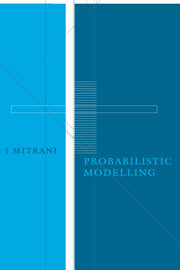Preface
Published online by Cambridge University Press: 05 June 2012
Summary
The designers and users of complex systems have an interest in knowing how those systems behave under different conditions. This is true in all engineering domains, from transport and manufacturing to computing and communications. It is necessary to have a clear understanding, both qualitative and quantitative, of the factors that influence the performance and reliability of a system. Such understanding may be obtained by constructing and analysing mathematical models. The purpose of this book is to provide the necessary background, methods and techniques.
A model is inevitably an approximation of reality: a number of simplifying assumptions are usually made. However, that need not diminish the value of the insights that can be gained. A mathematical model can capture all the essential features of a system, display underlying trends and provide quantitative relations between input parameters and performance characteristics. Moreover, analysis is cheap, whereas experimentation is expensive. A few simple calculations carried out on the back of an envelope can often yield as much information as hours of observations or simulations.
The systems in which we are interested are subjected to demands of random character. The processes that take place in response to those demands are also random. Accordingly, the modelling tools that are needed to study such systems come from the domains of probability theory, stochastic processes and queueing theory.
Information
- Type
- Chapter
- Information
- Probabilistic Modelling , pp. ix - xPublisher: Cambridge University PressPrint publication year: 1997
